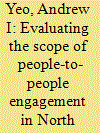|
|
|
Sort Order |
|
|
|
Items / Page
|
|
|
|
|
|
|
| Srl | Item |
| 1 |
ID:
135072


|
|
|
|
|
| Summary/Abstract |
Purpose—This article explores the politicization of North Korean human rights in US. foreign policy and the emergence of two different networks addressing suffering inside North Korea.
Design/methodology/approach—Drawing on evidence from primary and secondary accounts, interviews with human rights activists, and participant —observation at thirteen North Korean human rights events in Washington, D.(I., 1 trace the evolution of human rights action and discourse from the 19903 to the present
period.
Findir1gs—Short~ and long—term strategic goals interacted with different moral and principled beliefs, thus resulting in two different policy—activist networks working to alleviate the plight of North Koreans. One group stressed continued humanitarian engagement with North Korea. A second network emerged, shifting their focus towards advocacy and awareness, demanding greater political rights and freedoms for North Koreans.
Practical 1mplica1ions—This article helps identify different cleavages and areas for convergence for activists, practitioners, and policymakers when addressing North Korean human rights.
|
|
|
|
|
|
|
|
|
|
|
|
|
|
|
|
| 2 |
ID:
153579


|
|
|
|
|
| Summary/Abstract |
Although North Korea remains one of the most isolated countries in the world, hundreds of foreign actors continue to work quietly inside the country. What is the size and scope of foreign engagement inside the Democratic People's Republic of Korea (DPRK)? What types of activities do nongovernmental organizations, businesses, and other private actors conduct? What has been the experience and impact of those working inside the DPRK? Relying on an original data set and interviews with sixteen organizational field representatives and staff members with experience working inside the DPRK, I uncover basic trends related to people-to-people engagement in areas such as humanitarian relief, development assistance, educational assistance, professional training, and business interaction. Although impressive growth has taken place in foreign engagement in the DPRK, its potential impact remains unclear due to ongoing internal and external constraints.
|
|
|
|
|
|
|
|
|
|
|
|
|
|
|
|
| 3 |
ID:
159326


|
|
|
|
|
| Summary/Abstract |
Once considered severely under-institutionalized, East Asia has experienced a rapid process of institution-building since the end of the Cold War resulting in a significant degree of organizational overlap, both in membership and mandate. This paper examines the drivers and potential effects of institutional overlap in East Asia. It argues that the informal nature of Asian institutions coupled with competing visions of regionalism among member states make the region especially prone to overlapping regionalism. The consequences of such overlap for the time being have been positive. However, Asian policymakers must consider issues of institutional design to avoid steering the regional architecture in a direction which fosters regional rivalries and institutional competition in the long run. To illustrate the process of institutional overlap, I draw examples from a sub-set of regional organizations emerging out of the ASEAN family of institutions: the ASEAN+3, the East Asia Summit, and the Trilateral Cooperation Secretariat.
|
|
|
|
|
|
|
|
|
|
|
|
|
|
|
|
| 4 |
ID:
158956


|
|
|
|
|
| Summary/Abstract |
Drawing on insights from International Relations and social movement theories, I explore anti-base protests on Jeju Island and the ensuing politics of peace. I find that the clash between activists and policymakers is fundamentally tied to different views regarding the legitimacy of state actions on security policy and whether actors see states or people as the primary object of security. These real-world differences are mirrored in realist and critical perspectives of international politics. Policymakers tend to view the naval base as a means of protecting national interests and enhancing maritime security. Meanwhile, anti-base activists seek emancipation from an illegitimate state project uprooting a peaceful community. However, the perpetuation of a powerful realist discursive structure within the South Korean security and foreign policy establishment presents significant hurdles for anti-base movements in advancing their cause. My findings are based on ethnographic research in Gangjeong village in July 2012, interviews with activists and policymakers in South Korea, and an analysis of state and activist discourse in both Korean and English language sources.
|
|
|
|
|
|
|
|
|
|
|
|
|
|
|
|
|
|
|
|
|